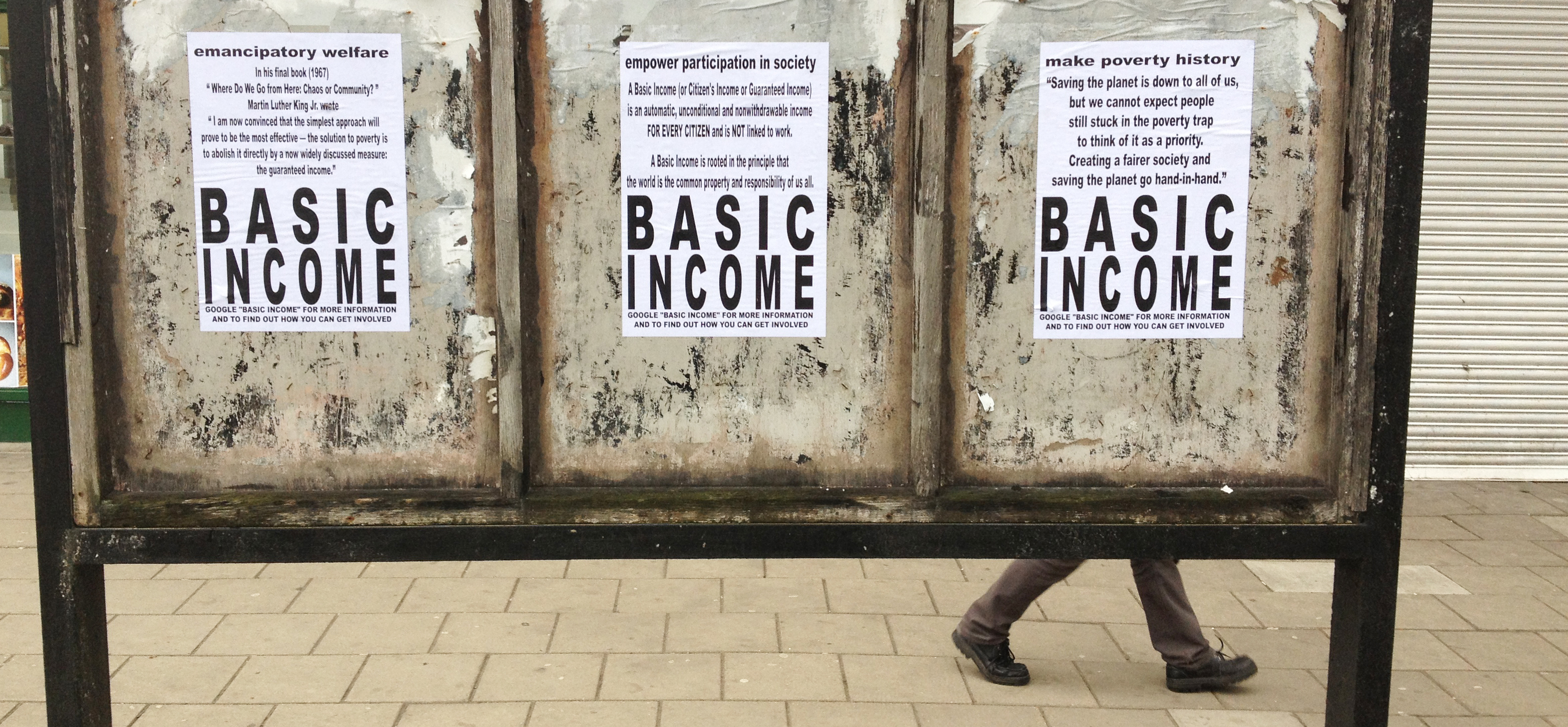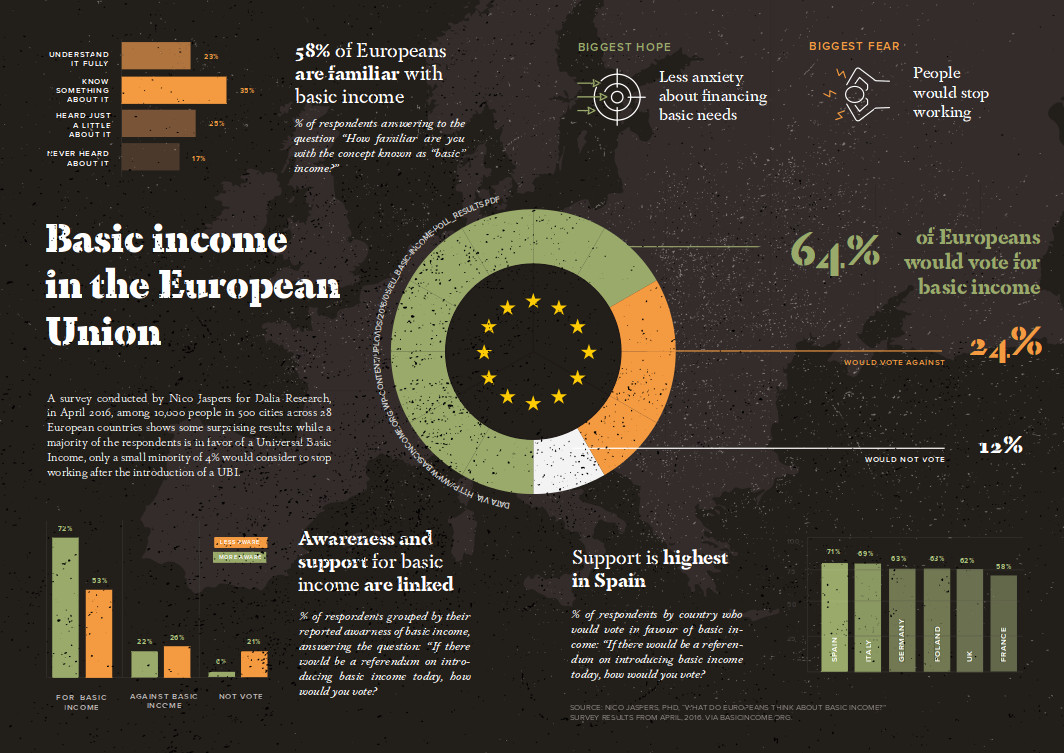Tipping the Scales
There is no such thing as the dignity of work. It is not the right to employment but a guaranteed material existence that gives dignity to human life.
Basic Income and the Future of Work
- Issue #2
- Authors
Here is a definition of work: “a set of remunerated or unremunerated activities whose results procure goods or services for members of our species.” It is useful for our purposes because it embraces the three kinds of work we will discuss below.
In this definition, not all activities can be classified as work, and work cannot be equated with effort alone. Climbing a mountain to 3,000 meters above sea level is laborious but usually it cannot be categorized as work. The definition does not require that work should be strenuous. Indeed, it includes “autotelic” work, that is, work that has a purpose in and of itself, such as voluntary work. Most kinds of work are not like this, but respond to a need that must be dealt with. The definition also embraces work carried out for pleasurable purposes. The result of the activity does not have to be a material object; it could be a service (paid for or not). Most results of housework, for instance, are not material objects.
Even today, the economic, political and social aspects of work are not always very well understood because, until the 1960s, both in academia and everyday life, what was generally called “work” referred exclusively to that done in the job market. For the purposes of this article, we will divide work into three categories—remunerated work, domestic work and voluntary work—and then ask a question: how would a Basic Income, understood as a guaranteed unconditional cash payment to every member of the population, affect these three kinds of work?
The Job Market and Basic Income
If a Basic Income were to be introduced, we could foresee at least four different effects on the job market: 1) increased bargaining power for workers; 2) more self-employment; 3) more part-time waged work; and 4) salary increases in certain jobs and decreases in others.
First, greater bargaining power for workers would be a big plus. The fact of receiving a guaranteed Income means workers would be less pressured to accept any job under any conditions. When they obtain the “exit option” of leaving the job market they also acquire a much better negotiating (or resistance) position. When you know your subsistence depends almost exclusively on the bosses at the other end of the table, taking negotiations to the verge of rupture is a risky business, as the latter can easily replace you with machinery or other workers from the “reserve army of labor”. This is the usual situation in today’s highly asymmetrical capitalist labor relationship.
 With a Basic Income, workers could convincingly refuse to accept undesirable, exploitative jobs and also think about more fulfilling, alternative forms of organizing their working conditions. Unlike Bartleby the Scrivener in Melville’s Wall Street story, they would have the dignity of saying “I would prefer not to”, without dying of hunger. Finally, during strikes, a Basic Income would constitute a guaranteed resistance fund giving workers a much stronger position than they have today, when they can be faced with punitive pay cuts while possessing no other resources to cushion the blow.
With a Basic Income, workers could convincingly refuse to accept undesirable, exploitative jobs and also think about more fulfilling, alternative forms of organizing their working conditions. Unlike Bartleby the Scrivener in Melville’s Wall Street story, they would have the dignity of saying “I would prefer not to”, without dying of hunger. Finally, during strikes, a Basic Income would constitute a guaranteed resistance fund giving workers a much stronger position than they have today, when they can be faced with punitive pay cuts while possessing no other resources to cushion the blow.
Second, a Basic Income would almost certainly encourage self-employment as it would considerably reduce the risks of starting a new venture. For a person embarking on a small business, a Basic Income would be a kind of guaranteed grant that would help to overcome the risk aversion that is often associated with this kind of project. It would also allow for greater innovation and make workers’ and consumers’ cooperatives a much more attractive and viable option.
Third, it is reasonable to assume that the introduction of a Basic Income would favor a choice of part-time jobs over full-time employment. At present, those who might like to work less are still often forced into full-time employment as the alternative simply does not pay enough. Then again, official statistics show that a lot of people working part-time do so because they cannot find full-time work. In other words, people today cannot choose the amount of hours they would like to work. A Basic Income would provide workers with much more choice.
Finally, a Basic Income would mean a guaranteed pay increase in some jobs and, possibly, lower wages in other positions. In concrete terms, it would bring about an upward pressure on wages for people doing disagreeable, unfulfilling work like manual labor or cleaning, while some authors suggest that the average salaries for prestigious or cushy jobs might drop because this type of work would be valued differently.
There is, of course, a general objection that people would not want to do some kinds of work at all if they had a Basic Income. We can come up with at least three answers to this objection. The first is directly related with possible changes in salary scales. Significant pay rises for certain undesirable jobs would make them more appealing for some people, at least in the short term. Second, and more generally, it would not be the end of the world if some jobs in tele-marketing or guarding refugee detention centers disappeared because people found better, more fulfilling things to do. Third, the fact that some kinds of work would simply not be viable at the pay levels demanded would encourage technological innovation and automation.
Here we have to question the notion of the “dignity of work”. There is nothing dignifying about work per se and certainly not a demeaning, badly paid job in wretched conditions. Of course there are gratifying kinds of employment, but they are not the norm. According to Forbes, 70 percent of people hate their jobs or are completely disengaged from them. Following Aristotle, Marx observed that if you are only free to sell your labor, you are not truly free but subject to a form of servitude. What gives dignity is having your material existence guaranteed. In this sense, supporting a Basic Income is perfectly compatible with (even complementary to) defending access to paid work for anyone who wants it. Indeed, proponents of a Basic Income have convincingly described how a Basic Income would make this goal more attainable.
The tremendously damaging changes in the job market resulting from the austerity policies and structural adjustments that were first imposed with the early symptoms of the global financial crisis are all too visible today. Some pundits, winding the clock back to the years before World War II, offer full employment as a “solution” to the crisis of work. But there are several urgent, interrelated realities that make a Basic Income a more reasonable priority: the burgeoning phenomenon of the working poor; the extremely precarious circumstances of much of the working class; the strong likelihood of further automation causing more unemployment without the compensation of newly created jobs; and huge changes in working relationships (or lack thereof).
It has been estimated that by 2033 almost half of today’s jobs will be automated. Many people working in the artificial intelligence field therefore support a Basic Income. One well-known example is data scientist Jeremy Howard, who has said that if we do not want half the world’s population to starve because they cannot add economic value, the best solution is to implement a Universal Basic Income.
Then there is the matter of taxation, which would be used to finance a Basic Income. Information technology is supplanting jobs, but it is also fast accelerating the concentration of wealth. A few decades ago, corporations needed roughly 100,000 employees to create $1 billion in value. In 2014, the value of WhatsApp, with 55 employees, was estimated at $19 billion. What has been referred to as “trickle-down” economics actually constitutes an upward flow of income that eventually stagnates in secret caches and offshore tax havens, thus stymying real wealth creation.
As it turns out, people with small incomes spend their money quickly while the rich hoard theirs. The Institute for Policy Studies has found that every extra dollar paid to low-wage workers adds about $1.21 to the US economy. If this dollar went to a high-wage worker it would add only 39 cents to Gross Domestic Product (GDP). In other words, if the $26.7 billion paid in bonuses to Wall Street punters in 2013 had gone to poor workers, GDP would have risen by some $32.3 billion.
If economies are to escape from the stranglehold of neoliberalism, become productive, offer a more just distribution of work, and begin to address the tremendous problems of today’s inequalities, some form of efficient redistribution of wealth is required. Let’s not forget that from the 1950s through to the early 1970s, the top income tax bracket was over 90% (in the UK and US)—and these economies boomed.
Basic Income and Domestic Work
Domestic work, also called reproductive or care work, has many definitions, mainly because of the difficulty of covering all the activities it involves. Yet there are some constants in all of these definitions: they generally include child-rearing, caring and nursing activities carried out at home, as well as other activities concerned with the wellbeing of people living under the same roof, especially with the oldest and youngest members of the household. Taking these constants into account, we could say that domestic work is that which is carried out in the home to attend to one’s own needs and those of others, and that it includes activities such as cleaning, preparing meals, shopping, looking after children, old people and any sick members of the household.
One of the oldest definitions of domestic work was offered by Margaret Reid in her pioneering work Economics of Household Production (1934). For Reid, domestic production means unpaid work carried out by and for members of the family. Interestingly, however, she focuses on activities that can be replaced by products on the market or remunerated services, when factors such as income, the market situation and consumer preferences make it possible to engage the services of others from outside the family.
Beyond these aspects, there are four characteristics of domestic work that should be taken into account. First, domestic work uses goods acquired on the market or through services offered by public administrations to produce goods and services destined for home (or self-) consumption, but it does not draw on exchange. Second, and related to this, there is no monetary payment. Third, the basic aim is reproduction of the labor force, with an immediate result being a reduction of subsistence costs. Finally, the person who carries out this work establishes some control over pace and timetables.
Domestic work is carried out by both sexes, but by no means proportionally. In rich and poor countries alike, women do by far the greater share. Surveys show that in the European Union, more than 80 percent of women who have children at home spend four hours every day on housework, compared to only 29 percent of men.
There is no doubt that when less time is spent on remunerated work, more time is given to domestic work. But the gender proportions are very different here, too. Women who spend less time on remunerated work devote much more time to domestic work than men in the same situation. Also deserving attention is the rather inconsistent practice of considering the exact same activity as work in some cases and as not-work in others (cooking, for example). Why? Because people think that only an activity for which one is paid can be called work.
How might domestic work be affected by a Basic Income? A general aside is relevant at this point. A Basic Income will not solve all the social problems related with the sexual division of labor. Sexual inequalities and gender-based discrimination are two major social problems requiring much more sweeping changes than a Basic Income alone. But a Basic Income would certainly permit greater freedom for women. More than two centuries ago, Mary Wollstonecraft pointed out that rights, citizenship and a better status for women—both married and single—required their economic independence.
Many women who are caught in the poverty trap within the present-day system of means-tested subsidies could escape from it with a Basic Income. The feminization of poverty would be greatly mitigated. Since Basic Income is universal and thus paid to both men and women, it follows that at least some problems arising from assigning allowances to the (usually male) head of the family would be resolved. A Basic Income could therefore change the distribution of domestic tasks between men and women in some households. Whatever the case, the negotiating power of a woman receiving a Basic Income would be greater with it than without it. To sum up, women would gain a lot, not only with an income but in terms of freedom as well.
Basic Income and Voluntary Work
Voluntary work is understood as using one’s own time in unpaid activities devoted to helping others, without coming under the rubric of domestic work. Voluntary work embraces a wide range of areas including nursing, education, solidarity with the poor and marginalized, prison work, counseling of battered women, relief work after natural disasters, helping refugees, and aid work in the developing world.
The motivation for engaging in voluntary work may be twofold. First is personal satisfaction. This would be the case with autotelic activity, the reward for which is the activity itself—the opposite of instrumental activity, where the process is merely a means to an end. Remunerated work, with some exceptions, is basically instrumental. If you have to acquire essential items like food, housing, clothes and so on, you need money and, for most people, paid work is the only way of getting it.
It would be difficult to understand voluntary work if it were not autotelic. The same thing happens with political participation, when understood as a firm commitment rather more than voting every so often—and something that brings its own rewards. Evidently, autotelic work would not include the work of officials, office-holders and paid appointees for whom political activity is as instrumental as any other salaried job, with its own perks, power, influence, cushy conditions, glitz and so on.
A second motivation of voluntary work might be altruism, understood as genuine concern for the welfare of anyone who benefits from the work. This is not to deny that some feel-good effects, or the desire to be admired, could come into play as instrumental factors in voluntary work. In short, this second benevolent motivation is related to the first, even if they can be conceptually separated.
One essential rule binding the political and economic effects of a Basic Income is that sustainable democracy requires high levels of political participation, which, in turn, requires much lower levels of economic inequality to free up time and resources for political activity. Today, when 62 people control more than half the world’s wealth, we have a highly unsustainable global political system on a planet now entering the Sixth Extinction. Without major changes at the base of society and in the ways in which we understand work and progress, things can only get worse.
The introduction of a Basic Income could provide a stimulus to voluntary work and political participation, which generally requires much more time than people have available at present. Voluntary work, in this sense, should not be considered an “alternative” to remunerated work, which, in the absence of other sources of income, remains essential for survival. Many people who would like to engage in voluntary activities simply cannot do so due to a lack of resources.
The democratic possibilities of greater freedom in the sphere of work were not lost on the freed slave Garrison Frazier, who stated that “the freedom promised by the proclamation is taking us from under the yoke of bondage, and placing us where we could reap the fruit of our own labor, take care of ourselves and assist the government in maintaining our freedom…”
Basic Income and Human Dignity
Poverty is much more than just an economic problem. The importance of its social, political, environmental, legal and occupational aspects become much clearer when the effects of a Basic Income are considered from the standpoint of the world’s poorest people. One example will suffice. In 2008-‘09 a pilot project was carried out in the Namibian village of Otjivero, where 930 residents received 100 Namibian dollars (about 9 euros) a month. Poverty levels fell from 76 percent to 37 percent, and figures for underweight children from 42 percent to 10 percent.
People in Otjivero started to use the local clinic, school attendance rose, household debt dropped, social relations improved and there was a considerable decrease in crime. Meanwhile, economic activity flourished when the beneficiaries started their own businesses like brick-making and baking bread. The conclusion is that, in poor countries, proceeds from cleaning up corruption, presently misused aid money, taxes on tourism, cars and luxury goods could be better used to finance a Basic Income.
In the absence of fully-fledged examples in practice, the general political benefits of Basic Income can only be hypothesized. As Naomi Klein suggests in This Changes Everything, they could even be planet-saving. Most people would agree that humans need more in their lives than just working to sustain bare existence. If basic needs are not met people are unlikely to fulfill other human needs like security, love, belonging, esteem, leisure, creativity, spontaneity and problem-solving—all aspects of human life that are commonly associated with freedom.
To put it slightly differently: the three core underlying values of human rights and a democratic society—freedom, justice and human dignity—require basic needs to be satisfied. Wage labor rarely respects freedom, justice and human dignity. A universal, unconditional Basic Income could go a long way in honoring the thus far hollow promise of Article 23 (1) of the Universal Declaration of Human Rights: “Everyone has the right to work, to free choice of employment, to just and favorable conditions of work and to protection against unemployment.” The bottom line, however, is that it is not work but a guaranteed material existence that gives dignity to human life.
Source URL — https://roarmag.org/magazine/basic-income-and-the-future-of-work/
Next Magazine article
Towards a Post-Work Society
- David Frayne
- June 25, 2016
Socialize the Internet!
- Joseph Todd
- June 25, 2016




